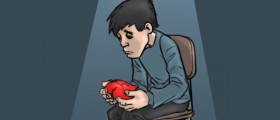
Chronic depression is also referred to as dysthymia. This condition manifests through numerous mild symptoms affecting a person for a longer period of time, predominantly making him/her feel unhappy. The reasons behind this condition are not yet established medically. However, experts claim that chronic depression has something to do with the brain changes and serotonin production, which controls our balancing of emotions. Therefore, stress, chronic illnesses, medications and personal life problems, all can be behind chronic depression.
Symptoms of Chronic Depression
Major depression and chronic depression share quite a lot of symptoms. However, those of the former are not as intense as those of the latter.
Mainly, chronic depression manifests through persistent sadness and an overall feeling of emptiness. Additionally, sleeping problems usually go hand-in-hand with this type of depression, along with insomnia, helplessness, worthlessness, guilt, lack of enjoyment in life, fatigue and deprivation of energy. Therefore, the sufferers from this type of depression often find it hard to cope with everyday activities, due to the fact that their concentration levels are extremely low, as well as their capability to make decisions and plan something. Eating disorders such as lack of appetite or overeating may appear as well. Finally, suicidal tendencies and aches all over the body are common, additional side-effects of chronic depression.
Currently, about 10.9 million Americans, aging from 18 and older, suffer from chronic depression. These people can function normally to a certain extent and may hide their depression well. The majority of people suffering from chronic depression are women.
Diagnosis and Treatment
In order to diagnose this condition, a health expert needs to observe the symptoms affecting the patient. Considering the fact that, with chronic depression, symptoms are less prominent than with major depression, doctors might have trouble while diagnosing the condition and they will give their best to differentiate a case of chronic depression from a side-effect of medications or a presence of some underlying medical conditions. Basically, everyone who has suffered from the symptoms of this condition for more than two weeks should seek medical assistance.
As for the proper treatment for this condition, early diagnosis and therapy are crucial factors. Psychotherapy, counseling, medications or various combinations of these three approaches, all can be possible ways of treating chronic depression successfully.
While psychotherapy provides the depressed person with ability to cope with and understand his/her condition better, medications deal with the symptoms and keep them at bay. However, many medications of this type have adverse effects. Thus, this kind of treatment is often minimal and the focus is on the psychotherapy and counseling. Nevertheless, SSRIs, MAO inhibitors, Tradozone and many other antidepressants can be a helpful part of the treatment, along with many alternative approaches such as light therapy. Yet, the main change needs to stem from withing the patient him/herself.

















Your thoughts on this
Loading...